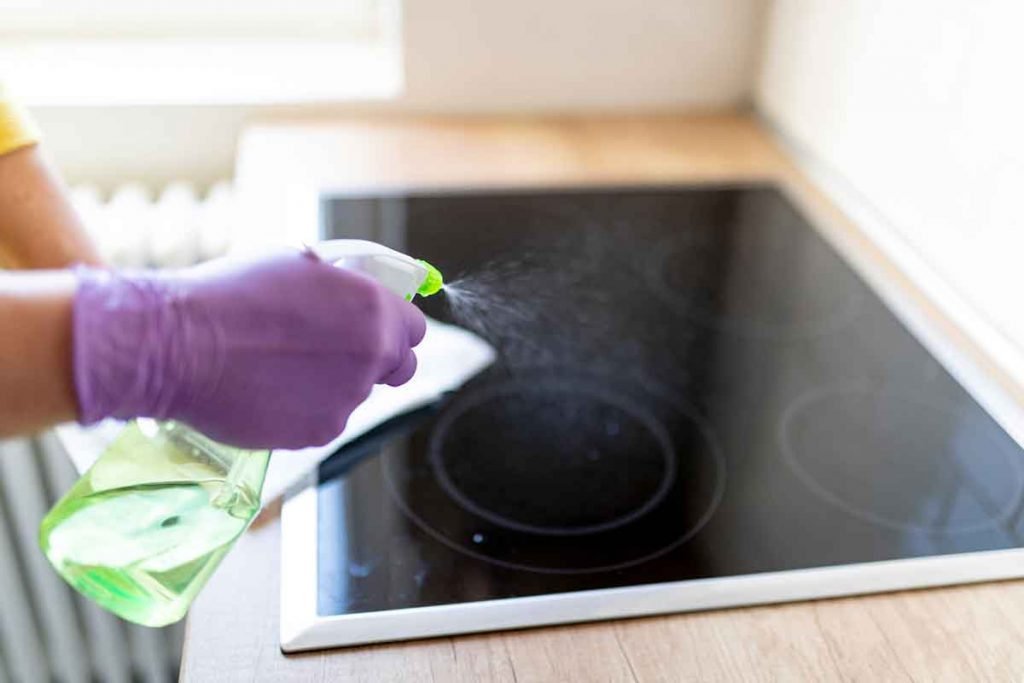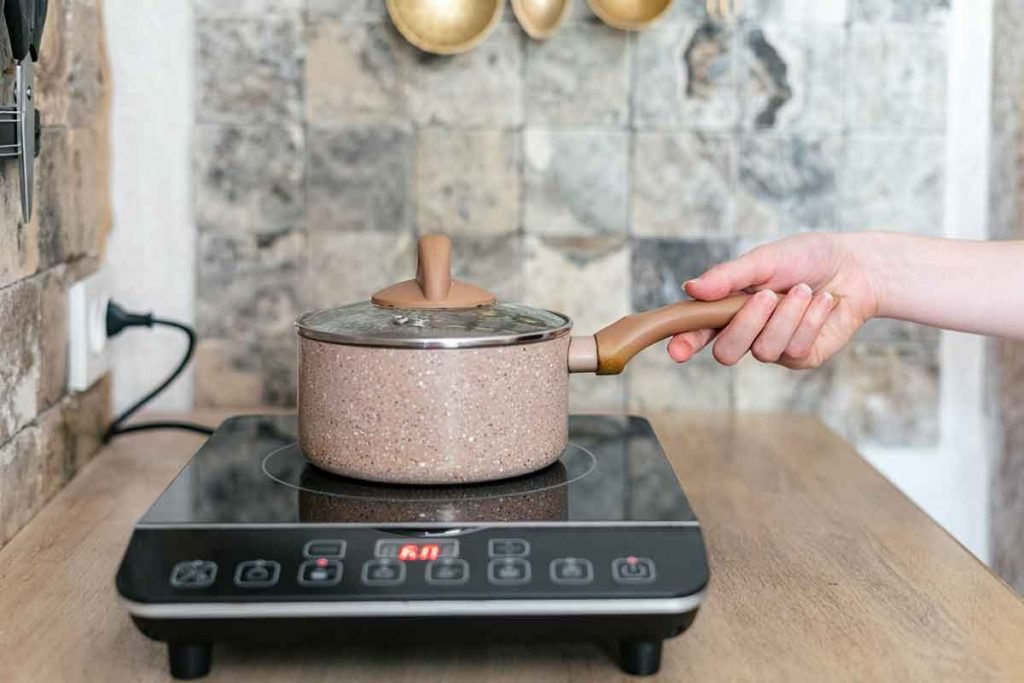Induction cooktops have made cooking a remarkable encounter because they can cook spotlessly and proficiently. These latest technological cooktops permit shoppers to use 70% less energy cooking and prepare food as experts do.
Do you want to buy an induction cooktop, but are worried you won’t be able to clean it appropriately? Well, you are in the right place. In this piece, we’ll show you how you can ensure your induction cooktop is appropriately cleaned by answering some FAQs.
Read a full review of the Best Cleaner for Induction Cooktop
Step-by-Step Process of Cleaning an Induction Cooktop Surface?
According to Kitchen Deet’s founder, Daniel P. Craig, cleaning induction cooktops shouldn’t be an uphill task.
“Induction cooktops are easy to clean because of their nonporous ceramic glass surface,” he said.
The smooth glass-ceramic surface of induction cooktop requires some love. You have to keep it spotless and regularly maintain it for optimal performance. And to do so, you need specific cleaning methods to keep it looking pristine.
Luckily, you can safely clean your induction cooktop at home using natural ingredients you likely already have in your pantry. Follow this step-by-step guide to remove dirt, grime, and cooked-on spills the natural way.
What You Need
- Baking soda
- White vinegar
- Dish soap
- Clean microfiber cloths
- Soft sponge or scrub pad
- Old toothbrush
- Plastic scraper
- Water
- Essential oils (optional)
Step 1 – Remove any burnt food debris
Gently scrape off any hardened or burnt food from the cooktop surface with a plastic scraper while the surface is still warm. This prevents food from sticking further as it cools.
Step 2 – Mix a paste of baking soda and water
In a small bowl, gradually mix baking soda with a bit of water to form a spreadable paste. Adjust thickness as needed. Baking soda naturally lifts dirt without scratching.
Step 3 – Clean with baking soda paste
Dip a soft sponge or scrub pad in the paste and scrub the cooktop surface in circular motions. Pay close attention to any stubborn stains. Rinse thoroughly with water and dry with a clean cloth.
Step 4 – Tackle tough stains with vinegar
For any remaining stains, apply a small amount of white vinegar directly on them and let sit for 5-10 minutes. Then scrub with a toothbrush. Vinegar’s acidity helps dissolve stubborn grease and food residue.
Step 5 – Remove odors with natural oils
Eliminate any lingering odors from cooking by rubbing a few drops of lemon, eucalyptus, peppermint or other essential oil onto the cooktop. Their pleasant aromas overpower food smells.
Step 6 – Finish with dish soap and water
Give the entire induction cooktop surface one final wipe down using a soft microfiber cloth, warm water and a small squirt of eco-friendly dish soap. Remove any soapy residue completely.
Step 7 – Dry and polish
Use a fresh, dry microfiber cloth to wipe the surface dry. For added shine, polish the cooktop by rubbing it in the direction of the grain with a dry paper towel or cotton cloth.
Note: Regular natural cleanings prevent significant buildup and keep your induction cooktop looking like new! Avoid abrasive pads or scrubbers that could scratch the delicate surface.
Can You Use 409 on Glass Top Stove
409 is not the ideal choice for a glass cooktop. Specialized glass stove cleaners or more natural options like vinegar and baking soda are gentler and safer for the induction cooktop surface. Here are some quick pointers to guide you:
- 409 It contains ammonia, which can damage or stain the stove’s glass-ceramic surface over time. Harsh cleaners with ammonia should generally be avoided for glass stove tops. They can wear down the smooth cooktop coating.
- For regular cleaning of a glass stove top, mild dish soap and water is the safest option. Avoid abrasive pads.
- For stuck-on grease or food spills, a specialized glass cooktop cleaner formulated for smooth surfaces would be a better choice than 409.
- If you have to use 409, then go ahead and dilute it with water first. Test on a small area and wipe away thoroughly to avoid residue buildup. Rinse the cooktop well after use to remove any 409 cleaner remnants that could be corrosive or stain long-term.
Can I Use Windex Glass Cleaner on My Induction Cooktop?
No, you can’t. The induction cooktop has a smooth surface that looks like the glass found on your windows, and you may assume that you can clean it with glass cleaner, such as Windex.
Unfortunately, you can’t use Windex or any other glass cleaner to clean an induction cooktop. Why? Well, Windex contains alkali, which can damage your cooktop.
Most glass cleaners are also ammonia-based, meaning if you use them to clean your indication cooktop you will leave ammonia stains on its surface. Ammonia may also find its way into your food, and this could lead to health issues.
Are Induction Cooktops Easy to Clean?
If you were thinking that cleaning the induction cooktop is a big deal to clean, think again. Those who use induction cooktops ascertain that they are the easiest kitchen apparatus to clean.
Induction cooktops are simpler to clean than standard cooktops because most of the parts that warm up are part in contact with the pot or container.
Tip: To keep your induction cooktop looking and working at its best, clean it regularly and use various items for its intended purpose.
How Do I Get Grease Off My Induction Cooktop?
Getting rid of grease from your induction cooktop should not be a big problem. All you need to have soapy water and a piece of cloth to do the job. There are other methods that you can use, but you should ensure the method you use is tried and tested.
Using soapy water and a piece of cloth to clean an induction cooktop
What Is the Best Cleaner for Induction Hobs?
One of the recommended natural induction cleaners is baking soda mixed with vinegar. You can use the mixture to remove both light and heavy stains, which makes it an ideal cleaning agent.
Most people also choose this mixture because it does not affect glass and thus will leave your induction hobs shining.
Is Bosch Induction Cooktop Cleaner Safe?
If you are planning to buy a quality induction cooktop cleaner, you should try Bosch induction cooktop cleaner. The product is made by the Bosch Company, which also produces induction cooktops.
This means that the product is intended to clean your induction cooktops. You can use Bosch induction cooktop cleaner to remove all types of dirt on glass surfaces, thus making it one of the best.
Be Sure to Choose the Right Induction Cooktop Cleaner
As an induction cooktop owner, you will come across various cleaners that you can use to clean your cooktop. But you have to be careful and ensure you make the right choices. Some cleaners can be corrosive and can cause long-lasting damage to your cooktop’s surface. It would be best if you kept these corrosive cleaners away from your induction cooktops.
Always make sure you use recommended cleaners when cleaning your induction cooktop. This will not only ensure your cooktop remains clean all the time but also, help it last longer. Using the right cleaners will also protect your family from harmful chemicals that could cause your health problems.
FAQs
Can I use abrasive cleaners or scrubbing pads on my induction cooktop?
Absolutely not. Avoid abrasives like scouring pads or chemical cleansers, as they can mar and scratch the delicate glass-ceramic cooktop surface. Use only soft cloths and gentle, non-abrasive cleaners.
How often should I clean my induction cooktop?
For optimal results, wipe down your induction cooktop after each use to prevent baked-on food and grease. Perform a deep clean weekly with degreaser to tackle any stubborn residues.
Can I use vinegar to clean my induction cooktop?
Yes, a diluted vinegar solution helps dissolve mineral deposits and stains safely. However, limit frequency as the acidity could impact the cooktop’s appearance and seals over time.
Are there specific cleaners I should avoid?
Steer clear of harsh cleaners with ammonia, abrasives, or oven formulas which can damage the cooktop coating. Mild dish soap, cooktop cleaners, or diluted vinegar are safer options.





Pingback: Who makes West Bend products? - Questionsmeter
What i do not understood is actually how you’re no longer really much more well-preferred than you may be now. You’re very intelligent. You know thus significantly in terms of this subject, made me personally believe it from a lot of numerous angles. Its like men and women aren’t interested unless it’s something to do with Girl gaga! Your individual stuffs great. At all times deal with it up!
Have you ever considered about including a little bit more than just your articles? I mean, what you say is fundamental and all. However imagine if you added some great images or video clips to give your posts more, “pop”! Your content is excellent but with images and clips, this website could undeniably be one of the best in its field.
Have you ever thought about adding a little bit more than just your articles? I mean, what you say is valuable and everything. Nevertheless think about if you added some great pictures or video clips to give your posts more, “pop”! Your content is excellent but with pics and videos, this site could certainly be one of the best in its niche. Terrific blog!